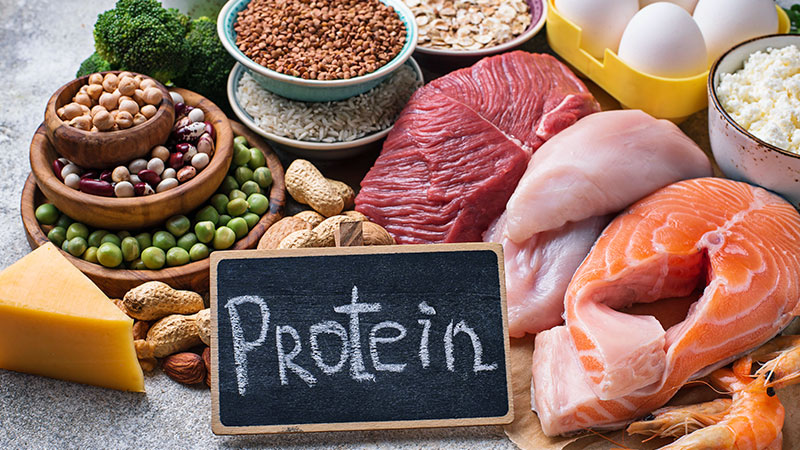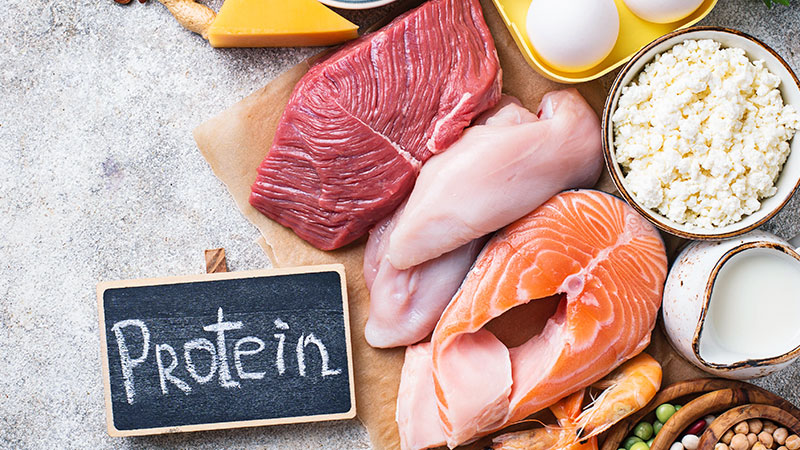Have you ever wondered if consuming protein can make you constipated? While protein itself doesn’t directly cause constipation, certain factors related to high-protein diets can contribute to digestive issues.
When people increase their protein intake, they often reduce their consumption of fiber-rich foods, such as fruits, vegetables, and whole grains. This reduction in fiber can lead to constipation.
Additionally, some high-protein foods, especially those from animal sources, can be low in fiber and high in fat, which may slow down digestion.
Proper hydration and maintaining a balanced diet with adequate fiber are essential to prevent constipation when following a high-protein diet.
Understanding the relationship between protein intake and digestive health can help you enjoy the benefits of protein without experiencing uncomfortable side effects.

What is Protein?
Protein is a vital macronutrient essential for numerous bodily functions and overall health. Here are key points to understand about protein:
Building Blocks of Life
Proteins are made up of amino acids, which are often referred to as the building blocks of life. There are 20 different amino acids, nine of which are essential and must be obtained through diet.
Muscle Growth and Repair
Protein is crucial for the growth, repair, and maintenance of muscles and tissues. It helps in healing wounds and regenerating cells.
Enzyme and Hormone Production
Proteins play a vital role in the production of enzymes and hormones. Enzymes are proteins that facilitate biochemical reactions, while hormones like insulin are proteins that regulate various bodily functions.
Energy Source
While carbohydrates and fats are primary energy sources, protein can also be used for energy, especially during prolonged physical activity or when carbohydrate intake is low.
Nutrient Transport and Storage
Proteins help transport nutrients throughout the body. Hemoglobin, a protein in red blood cells, transports oxygen from the lungs to the rest of the body.
Dietary Sources
Common sources of dietary protein include meat, poultry, fish, eggs, dairy products, legumes, nuts, and seeds. Plant-based sources like beans, lentils, tofu, and quinoa are also excellent for vegetarians and vegans.
Protein is a multifunctional macronutrient crucial for muscle maintenance, enzyme and hormone production, immune function, and overall health. Consuming a balanced diet rich in diverse protein sources is essential for optimal bodily function.
Does Protein Make You Constipated?
Protein itself does not directly cause constipation, but certain factors associated with high-protein diets can contribute to digestive issues.
Understanding these factors can help manage and prevent constipation while still reaping the benefits of a protein-rich diet.
1. Low Fiber Intake

One of the primary reasons high-protein diets can lead to constipation is the reduction in fiber intake. Many people increase their protein consumption by eating more animal products such as meat, eggs, and dairy, which are low in fiber. Fiber is essential for regular bowel movements as it adds bulk to the stool and helps it pass through the digestive tract. A lack of fiber can result in harder, more difficult-to-pass stools.
Solution: To avoid constipation, ensure your diet includes plenty of fiber-rich foods like fruits, vegetables, whole grains, and legumes. Even when following a high-protein diet, balancing it with sufficient fiber is crucial.
2. Dehydration

High-protein diets often require more water for the kidneys to process and eliminate the byproducts of protein metabolism. Without adequate hydration, stools can become dry and hard, leading to constipation.
Solution: Drink plenty of water throughout the day. Aiming for at least 8 cups (2 liters) of water daily can help keep your digestive system functioning properly. Also, consider increasing your water intake when consuming higher amounts of protein.
3. Excessive Dairy Consumption

Dairy products are common sources of protein, especially for those on high-protein diets. However, for some people, dairy can cause digestive issues, including constipation. This may be due to lactose intolerance or sensitivity to certain proteins in milk.
Solution: If you suspect dairy is causing your constipation, try reducing your intake or switching to lactose-free or plant-based alternatives such as almond, soy, or oat milk.
4. Lack of Variety in Protein Sources

Relying solely on animal-based proteins can contribute to a lack of dietary variety and insufficient intake of other essential nutrients that support digestive health.
Solution: Incorporate a variety of protein sources into your diet, including plant-based options like beans, lentils, quinoa, tofu, and nuts. These foods not only provide protein but also contain fiber and other beneficial nutrients.
5. High Fat Content

Some high-protein foods, particularly fatty cuts of meat and full-fat dairy products, are also high in fat. High-fat diets can slow down digestion, leading to constipation.
Solution: Choose lean protein sources such as chicken breast, turkey, fish, and plant-based proteins. Additionally, incorporate healthy fats like those from avocados, nuts, and seeds in moderation to support digestion.
How Much Protein Should You Consume Daily?

Determining the right amount of daily protein intake depends on various factors such as age, sex, activity level, and overall health. Here are some guidelines and considerations to help you understand how much protein you should consume daily:
General Recommendations
The DRI for protein for the average adult is 0.8 grams per kilogram of body weight. This translates to about 56 grams per day for the average sedentary man and 46 grams per day for the average sedentary woman.
To calculate your specific needs, multiply your body weight in kilograms by 0.8. For example, if you weigh 70 kg (about 154 pounds), you would need 56 grams of protein per day (70 kg x 0.8 g/kg = 56 g).
Specific Recommendations
Those who engage in regular physical activity, especially strength training, may need more protein to support muscle repair and growth. The recommended intake for athletes can range from 1.2 to 2.0 grams per kilogram of body weight.
For example, a 70 kg athlete may need between 84 and 140 grams of protein per day.
Protein needs to increase with age to help maintain muscle mass and strength. Older adults are often advised to consume 1.0 to 1.2 grams of protein per kilogram of body weight.
For instance, a 70 kg older adult might need between 70 and 84 grams of protein per day.
Protein requirements increase during pregnancy and lactation to support fetal growth and milk production. Pregnant women should aim for about 1.1 grams per kilogram of body weight, while nursing mothers might need around 1.3 grams per kilogram.
A pregnant woman weighing 70 kg would need approximately 77 grams of protein per day, and a nursing mother of the same weight might need about 91 grams.
Considerations for Protein Sources
Not all protein sources are created equal. It’s important to consume high-quality protein that contains all essential amino acids.
Animal sources like meat, fish, eggs, and dairy are complete proteins, while most plant sources like beans, lentils, and nuts may need to be combined to ensure a complete amino acid profile.
While it’s important to meet your protein needs, it should be part of a balanced diet that includes adequate amounts of carbohydrates, fats, vitamins, and minerals. Overconsumption of protein, especially from sources high in saturated fat, can have adverse health effects.
The amount of protein you should consume daily varies based on individual factors such as activity level, age, and health status.
The general recommendation is 0.8 grams per kilogram of body weight for sedentary adults, with higher needs for athletes, older adults, and pregnant and nursing women.
Things to Consider About Intaking Protein

When incorporating protein into your diet, it’s essential to consider several factors to ensure you’re getting the right amount and type of protein that suits your individual needs. Here are some key points to consider:
1. Protein Quality
Proteins are made up of amino acids, and it’s important to consume a variety of these to meet your body’s needs. Complete proteins contain all nine essential amino acids and are typically found in animal products like meat, fish, eggs, and dairy.
Incomplete proteins, found in most plant sources, lack one or more essential amino acids. Combining different plant proteins (e.g., rice and beans) can ensure you get a complete amino acid profile.
2. Daily Protein Requirements
Protein needs vary based on age, sex, activity level, and health status. The general guideline is 0.8 grams per kilogram of body weight for sedentary adults.
Athletes, older adults, and pregnant or nursing women may require more. Consulting with a healthcare provider or dietitian can help determine your specific protein needs.
3. Protein Timing
Spreading protein intake throughout the day can optimize muscle protein synthesis and help maintain muscle mass. Aim to include a source of protein in each meal and snack to keep your energy levels stable and support muscle repair and growth.
4. Protein Sources
Incorporating a mix of animal and plant-based proteins can provide a range of nutrients. Animal proteins are rich in complete proteins, while plant proteins offer additional fiber, vitamins, and minerals.
Examples of good protein sources include lean meats, poultry, fish, eggs, dairy products, legumes, nuts, seeds, and whole grains.
5. Health Considerations
Be mindful of any dietary restrictions or allergies. For example, those with lactose intolerance should opt for lactose-free dairy products or plant-based alternatives.
Ensure your diet includes a balance of macronutrients. Excessive protein intake at the expense of carbohydrates and fats can lead to an imbalanced diet, affecting overall health.
6. Hydration
Higher protein intake requires more water to help the kidneys process and eliminate the byproducts of protein metabolism. Drink plenty of water throughout the day to stay hydrated and support kidney function.
7. Potential Side Effects
Some people may experience digestive discomfort, such as bloating or constipation, when consuming high amounts of protein, especially from animal sources. Including fiber-rich foods and staying hydrated can mitigate these issues.
Individuals with pre-existing kidney conditions should be cautious with their protein intake. Excessive protein can strain the kidneys, so it’s important to follow medical advice tailored to your health status.
8. Sustainability
Consider the environmental impact of your protein sources. Plant-based proteins generally have a lower environmental footprint compared to animal-based proteins. Incorporating more plant-based proteins can contribute to a more sustainable diet.
9. Protein Supplements
Protein supplements like whey, casein, or plant-based powders can be convenient for meeting protein needs, especially for athletes or those with higher requirements.
However, it’s best to prioritize whole food sources of protein and use supplements to fill gaps as needed.
Choose high-quality protein supplements free from harmful additives and contaminants. Look for third-party testing or certification to ensure product safety and efficacy.
10. Cost
Protein-rich foods can vary in cost. Incorporate affordable protein sources such as eggs, legumes, and whole grains to meet your needs without straining your budget.
Intaking protein is vital for overall health, muscle maintenance, and various bodily functions. To maximize the benefits, consider the quality and variety of protein sources, your individual needs, timing, hydration, and the balance of your diet.
Wrapping Up
While protein itself does not directly cause constipation, certain dietary habits associated with high-protein intake can contribute to digestive issues.
To prevent constipation, it’s important to maintain a balanced diet that includes adequate fiber, stay hydrated, vary your protein sources, and monitor your intake of high-fat and dairy products.
It’s crucial to focus on high-quality protein sources and maintain a balanced diet to support overall health. For personalized advice, consulting a healthcare provider or a registered dietitian is recommended.
By making these adjustments, you can enjoy the benefits of a protein-rich diet without experiencing uncomfortable digestive side effects.
